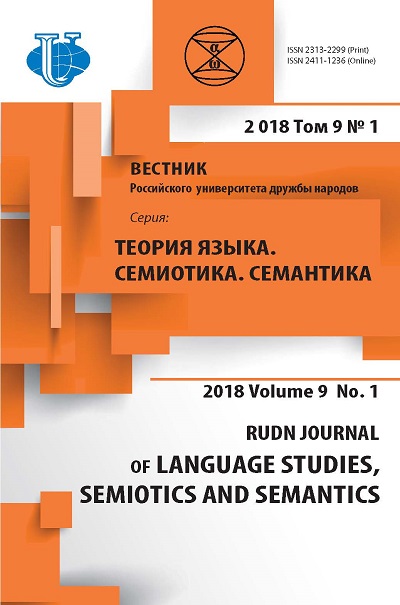Comminicative strategies of american polititians (basing on the 2016 election campaign)
- Authors: Tymbay A.A.1
-
Affiliations:
- MGIMO University
- Issue: Vol 9, No 1 (2018)
- Pages: 105-123
- Section: POLITICAL LINGUISTICS
- URL: https://journals.rudn.ru/semiotics-semantics/article/view/18271
- DOI: https://doi.org/10.22363/2313-2299-2018-9-1-105-123
- ID: 18271
Cite item
Full Text
Abstract
The article contains the analysis of basic communicative strategies employed by the participants of TV debates, a type of a political discourse. The study was conducted using the videos of Trump - Clinton debate during 2016 US presidential campaign. The major principles of building of a political dialogue of this type were singled out by means of a linguistic analysis, showmanship, competiveness and personification being the top ones. The article illustrates different types of turn-taking, shows the difference between turns and backchannels, simple overlaps and deliberate interruptions of a partner. However, the choice of turn-taking type is not random. It depends on the strategic planning of the candidates, who view it as a means of projecting their personality as well as their political programme onto the audience. Thus the dual nature of discourse is highlighted: a dialogue between the candidates and the dialogue with the audience. The communicative strategies chosen by the politicians are viewed by the author as a means of influencing the opponent and the electorate in general, one of them being denigrating the opponent for the purpose of creating a more beneficial personal profile. In the end the author suggests using the conclusions made in teaching students oratory and effective public speaking techniques.
About the authors
Alexey Alexeevich Tymbay
MGIMO University
Author for correspondence.
Email: tymbay@inbox.ru
PhD, Associate Professor of the Chair of the English Language № 1, MGIMO University. Research interests: communicative linguistics, political discourse, pragmatics
76, Prospect Vernadskogo, Moscow, Russia, 119454References
- Alieva, T.V. (2008). Conceptual opposition We-They in the political discourse of the US press (on the election campaign materials). Filologicheskie nauki v MGIMO, 34 (49), 18—26. (In Russ).
- Aljoshina, E.Ju. (2015). Public political discourse of a conflict situation. Moscow: Prometej. (In Russ).
- At’man, O.V. (2011). Verbalisation of self-representation strategies in presidential TV debates in the USA. Politicheskaja lingvistika, 1(35), 96—102.
- Budaev, Je.V. & Chudinov, A.P. (2008). Foreign political metaphorology. Ekaterinburg. (In Russ).
- Duskaeva, L.R. (2012). The dialogue nature of newspaper genres. SPb. (In Russ).
- Ivanova, Ju.M. (2003). Stratageis of speech influence in election debates [abstract of dissertation]. Volgograd. (In Russ).
- Jablokova, T.N. (2011). Emotional utterances in dialogues and monologues. Filologicheskie nauki. Voprosy teorii i praktiki, 2(9), 191—197. (In Russ).
- Kobzeva, N.A. (2011). Comminicative competence as a fundamental category of modern foreign language teaching. Molodoj uchenyj, 3(2), 118—121. (In Russ).
- Nikiforova, M.V. (2015). Argumentation means in the genre of political debates (based on E. Royzmann TV debates). Politicheskaja lingvistika, 1(51), 120—125. (In Russ).
- Noblok, N.L. (2007). Author strategies in English political discourse (based on Bush — Kerry TV debates). Tambov. (In Russ).
- Pavlova, N.D. & Grigor’eva A.A. (2012). Means of influence in a mass-media discourse. Mir nauki, kul’tury, obrazovanija, 2(33), 122—125. (In Russ).
- Rassinskaja, O.V. (2015). Speech peculiarities of political communication. Molodoj uchenyj, 1, 412—413. (In Russ).
- Shejnov, V.P. (2006). The Hidden management of a person. Moscow: AST. (In Russ).
- Sorochenko, V.V. (2002). TV debates as an election technology. URL: http://www.psvfactor.ors/ debatv.htm (In Russ) (accessed: 01.10.2017).
- Tsvetkova, N.I. (2007). The use of communicative strategies in teaching speaking to ESP students. Vestnic MGLU, 519, 144—148. (In Russ).
- Tymbay, А.А. (2017). Who won? The linguistic analysis of presidential TV debates 2016 in the USA. Ivzestia of the Volgograd State Pedagogical University, 2 (115), 155—160. (In Russ).
- Tymbay, A.A. (2015). The status of a dialogue in the context of political interaction. In Filologicheskie nauki v MGIMO: Sbornik nauch. Trudov, 57 (72). Moscow: MGIMO-Universitet. pp. 74—79. (In Russ).
- Tymbay, A.A. (2017). Political Dialogue in ESP classes. In Mezhdunarodnyj nauchno-issledovatel’skij zhurnal, 02 (56) Part 1. pp. 109—112.
Supplementary files












